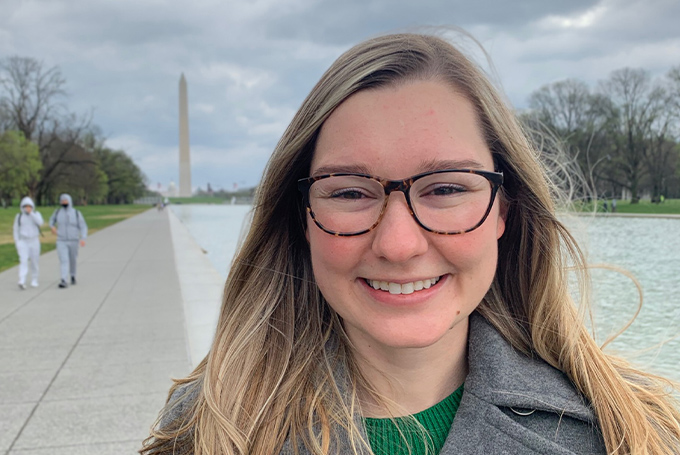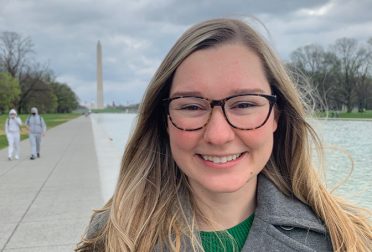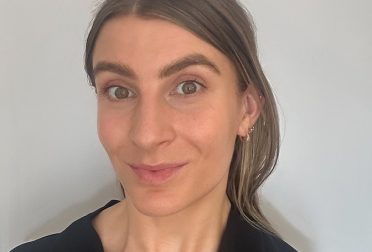Morgan Orlovskiy joins SDM as she transitions out of serving in the U.S. Navy, where she was a nuclear engineer. She’s looking forward to exploring Course 16 and energy-related classes in the School of Engineering as well as taking courses in the Sloan School of Management. And she’s eager to apply what she’s learned about systems in her work to other fields outside the Navy. “I think systems management and systems integration are crucial,” she says. “I’ve seen them be the backbone that unites a whole organization and makes a project come across the finish line. So I’m interested to see how that works on a corporate scale.”
What has your career been like before SDM?
I went to the Naval Academy straight out of high school and then commissioned as a Naval Officer in 2017. After earning my bachelor’s in aerospace engineering, I served and deployed on a warship out of San Diego, CA before going through the Navy nuclear propulsion program, which was a year of nuclear engineering schooling and training that brings people up to a high level of knowledge in engineering practices. And then I was a nuclear engineer on an aircraft carrier for a few years.
On a modern aircraft carrier, there are two nuclear reactors. You’re standing watch as the supervisor over one of those, the senior watch stander, and then you’re also in charge of a division, which we call our day job. I had up to 85 Sailors who were under my purview. We managed millions of dollars of reactor control and safety instrumentation, including day-to-day operations and maintenance. I was stationed on an aircraft carrier in the shipyard, so we were removing and replacing spent nuclear fuel. I feel really fortunate to have worked with the leaders that I was stationed with. And I think that’s probably the thing I will miss the most about the Navy, and the thing I hope to find within SDM. That cohort aspect really drew me to the program, because I’m used to working very closely with a team of coworkers. And from talking to other veterans, what they miss the most is that sense of camaraderie and the teamwork aspect when they transition out of service.
What’s something that excites you about meeting your new classmates? Being part of the cohort definitely sounds like part of it.
I’m transitioning from a career of naval service where that is all I’ve known. And those are the only people I’ve worked with, all similarly service-oriented and focused. I’m super excited to be in a group of diverse thinkers from different backgrounds and industries. It’s going to play a pivotal role in my transition, being exposed to people from different industry backgrounds, to be able to see where I fit best. Sometimes we find ourselves in an echo chamber talking to other Naval Officers and other veterans. But I think that diverse thought is going to play a huge role in what really makes the SDM experience holistic for me. I’m absolutely eager just to see the personalities and the flavors that come from different industries, and how people can speak to those experiences as well.
What’s something you’re looking forward to learning in the core class?
How to manage folks and how to work interactively in teams outside of the military. Inside the military, we have a chain of command. When we have an argument, somebody wins because they outrank you, and it’s very cut and dry. So I’m looking forward to being part of a cohort and working in groups where we have to find creative solutions. As peers and equals we’re talking from different perspectives and we have to find common ground. And we have to work collaboratively in a way that I haven’t been exposed to as frequently, because of the confines of military structure and chain of command.
How do you think a systems approach will help you in your work?
In my career progression in the Navy nuclear program, you start out qualifying as a Surface Warfare Officer where you stand bridge watch and you learn to drive a warship, and then you become a nuclear engineer and you manage the operations and maintenance of a nuclear reactor. Working with those two different sets of people and seeing how those two organizations handle system integration and systems management differently has already been pretty eye-opening. Having the systems knowledge to see top down through an organization will be super essential as I’m transitioning to a new career. I’m bringing some engineering and leadership experience to the table. But I hope to learn from the program how that looks on the corporate side, so that as I pivot careers I can bring everything I’ve learned about system integration from both sides to my new career.
What else excites you about the program, or coming to MIT?
I am super excited to be in Boston. I’ve had the opportunity to move with the Navy all across the United States, but Boston/Cambridge is probably my favorite city, so I feel very fortunate to be here for the next two years. I’m also very excited about the flexibility that the program offers. As you can imagine, the Navy offers less flexibility in terms of scheduling. And I’m also excited for the whole ecosystem of MIT. Being able to be involved in extracurriculars, lab research, intramural sports, industry-based clubs, anything that really sparks my interest, seems like an unmatched opportunity. I feel very grateful for the opportunity coming into my thirties to have this transition and pivot point in one of the most diverse and education-focused places in the world. I feel very grateful to be here.




